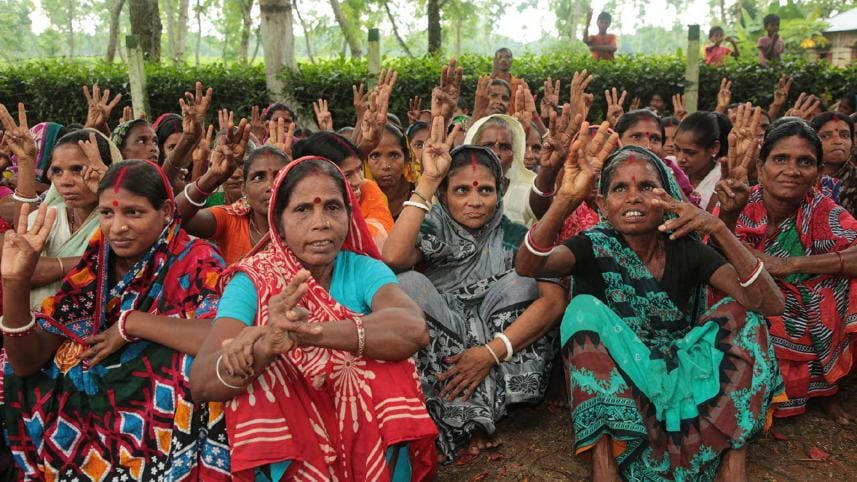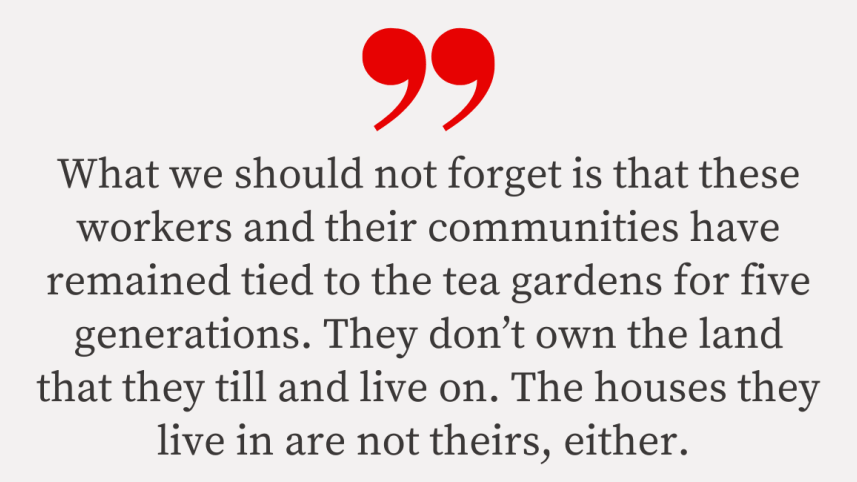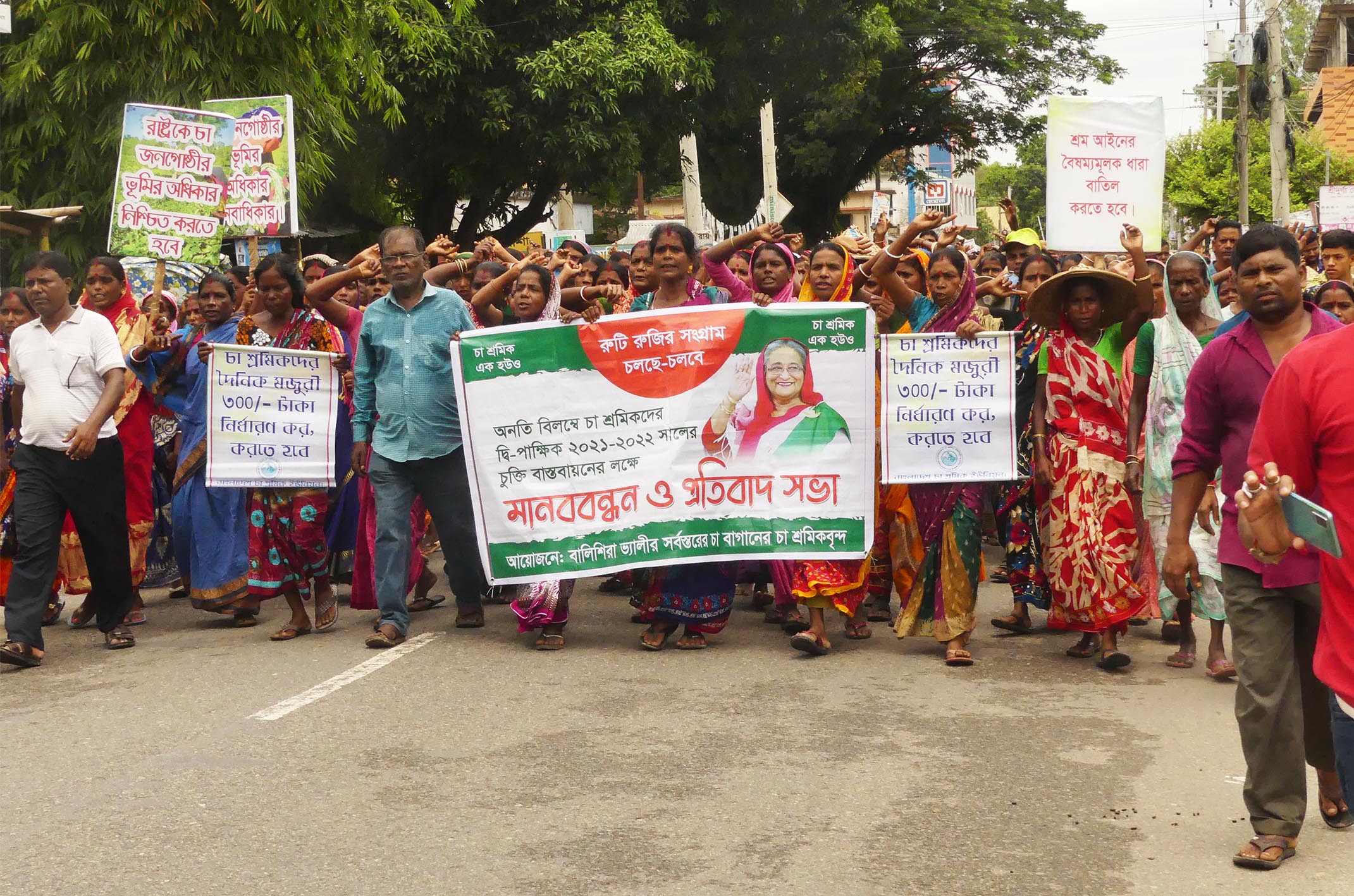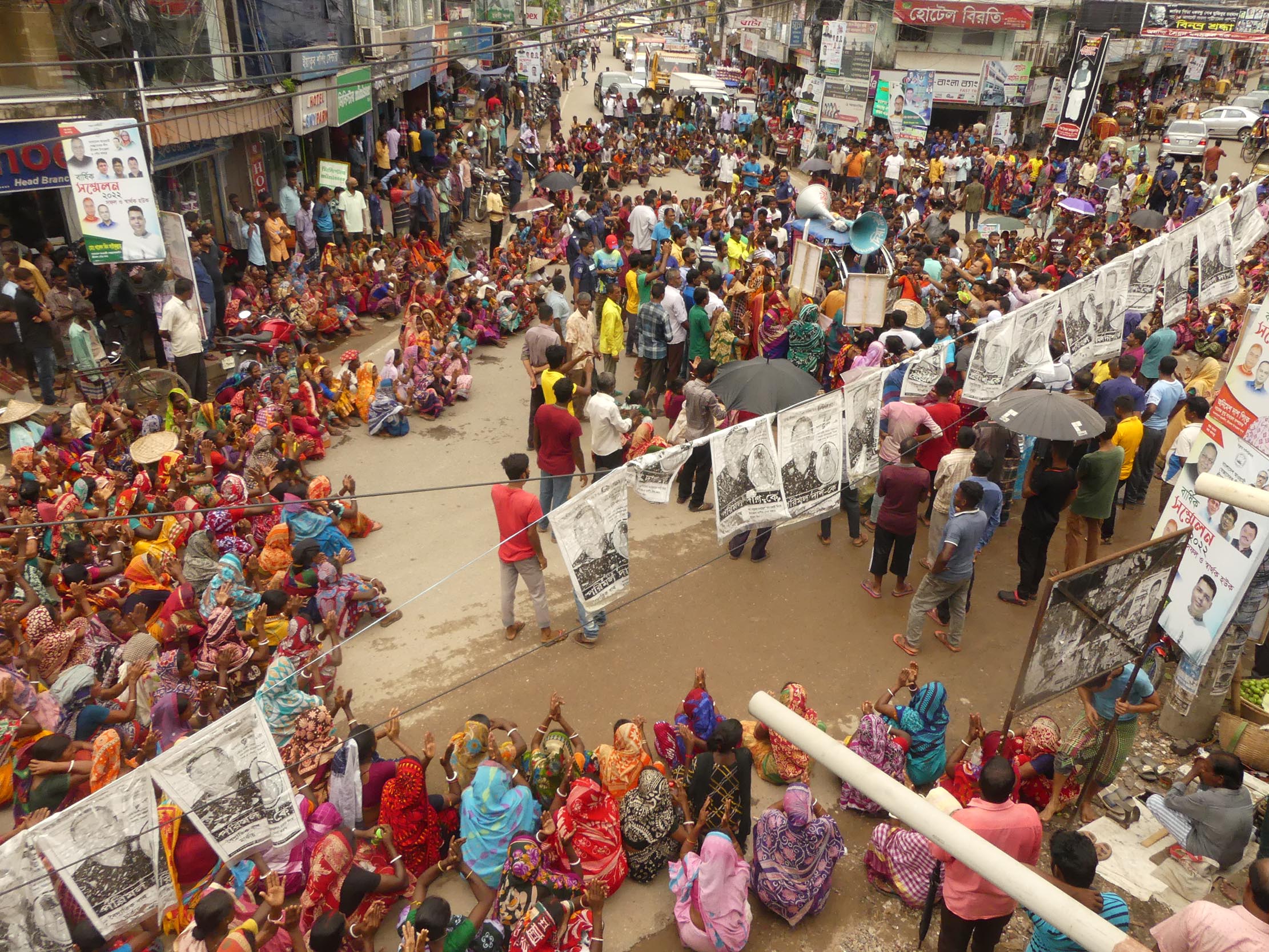Tea workers’ strike ends. What’s next?

During an unprecedented strike between August 9 and 27, the tea workers in northeastern Bangladesh demanded a cash pay of Tk 300 per day. The tea garden owners agreed to raise the wage to Tk 145 per day, which enraged the workers. In defiance of the owners' decision, government officials and agencies (DCs, Department of Labour and police) and their own leaders, the tea workers continued their strike till August 27.
They began to cool down when Environment Minister Md Shahab Uddin, who is an MP from Moulvibazar-1 constituency, visited a blockade on the Moulvibazar-Barlekha regional highway on August 24 and assured the protesting tea workers that their wage issue would be settled soon. Responding to the workers' firm position that they would not go back to work until their demand for Tk 300 in daily wage was met, the minister said, "The prime minister will talk to you on [the] wage issue and make a decision. The matter will be solved in three days."
Three days later, on August 27, Prime Minister Sheikh Hasina sat with the tea garden owners' apex body, Bangladesh Tea Association (BTA), and fixed the daily cash wage at Tk 170. The tea workers wanted the PM to interfere and promised to accept what she would decide for them.
Although what they had demanded originally was more than what they got, never before in history have these tea workers seen an increase of Tk 50 at one go. In an agreement between the BTA and Bangladesh Cha Sramik Union (BCSU), the lone trade union and combined bargaining agent of tea workers, the increase was Tk 18 for 2019 and 2020 – the maximum till then.
The workers have gone back to work now with hopes that their expectation for just wages would be met in the future. All parties, including the workers' union and the owners' association, now have breathing space and time to build faith in each other.
However, there are other burning issues to be discussed at length and understood so that the workers do not have to resort to such strikes again. The PM had to interfere when the Minimum Wage Board and the negotiation between BTA and BCSU failed completely. She has understandably acted upon a special power given to the government by Section 140(A) of the Labour Act to bring an end to the strike.
However, the calculation of wages, including the plucking bonus, overtime payment for work in the field and factories, and fringe benefits, should be done taking the labour law into consideration. The sub-section 45 of Section 2 of the Labour Act does not allow inclusion of most of the facilities/items that the owners monetise in their calculations of what they give to the workers in addition to the cash wage. In a press conference on August 30, BTA leaders claimed that, after the increase in wages, what they would now give to a tea worker would be nearly Tk 540 per day! But such calculations are absurd.
To be pragmatic about calculating the cash components of fringe benefits, BTA, BCSU and other parties involved may check the calculation from our neighbour, Assam, wherein the calculation of wages is acceptable to all parties. In Assam, the daily cash wage was fixed at Rs 232 for Brahmaputra Valley and Rs 210 in Barak Valley, effective from August 1.
The Labour Welfare Department of Assam has also published the cash component of wages paid in kind and the rate of compensatory benefits per day, which stand at Rs 104. Thus, the composite wages for workers per day in Brahmaputra Valley are Rs 336 and Rs 314. I mention the situation of wages in Assam because of the similarity between Assam and Bangladesh.

BTA's calculation of what a worker gets comes as a big surprise to workers and their union. According to the BTA, 90 percent of the workers work in the field planting tea, taking care of the plantations, and plucking tea leaves. While those working in the field will now get Tk 170 in daily cash pay, those working in the factory (10 percent of the workers) will get little more. Then, the owners have added 17 other components which are paid in cash and kind. BTA has not consulted the workers' union at all in this calculation of wages. Many of the components have been included in violation of the labour law. Those that merit as cash components paid in kind are also overestimates.
"I reject the owners' calculation of wages," says Rambhajan Kairi, executive advisor of BCSU and a member of the Minimum Wage Board to represent tea workers. Kairi suggests that the owners should sit with BCSU to jointly calculate the cash component of the wages paid in kind. "What the owners have done so far is just arbitrary," he asserts. "In Assam, the plucking bonus and overtime are not added to wages."
Advocate AKM Nasim, country programme director of Solidarity Centre, which works for workers' rights, has argued in support of Rambhajan Kairi. "Tea garden owners presented a misleading calculation of cash wages and the in-kind services they provided to tea workers when the daily cash wage was Tk 120. The employers' calculation confuses us when they include plucking bonuses, festival bonuses, medical and annual leave benefits and provident fund's administrative expenses, among others, within the definition of wages," Nasim said. "The Labour Act does not allow the owners to add these as 'basic wage.'"
Now that the tea workers have gone back to work, they will start getting a daily cash wage of Tk 170, which was previously Tk 120. This means the new wage structure would have gone into effect from January 2021. So, from then to date (end of August 2022) there are 20 months for which a worker who has worked all work days during this period will get an arrear of around Tk 30,000 at a simplified calculation (Tk 50x30x20). A post-factum agreement (effective from January 2021 to December 2022) will now be signed between BTA and BCSU, as it happened in the past to facilitate the payment of arrears in instalments.
One concern is if 40,000 casual tea workers will get the arrears or not. According to media reports quoting the secretary of BTA, only the registered workers will get the arrears. The casual workers have been getting the same cash wages for the last two agreement periods (four years) as the registered workers. They do not get equal fringe benefits, however. "Had the agreement been signed in time, the casual workers would get the increased wages," argues Rambhajan Kairi. "Therefore, the practice of paying arrears to the casual workers should start from now on."
What we have witnessed in August begins a new era of protest in the tea gardens. The tea workers have demonstrated the strength of their united voice. They have gone back to work with their key demand only partially fulfilled. Yet, it is seen as a victory of the tea workers' quiet revolt.
What we should not forget is that these workers and their communities have remained tied to the tea gardens for five generations. They don't own the land that they till and live on. The houses they live in are not theirs, either. There are issues other than wages they can raise, leading to a bigger movement. For now, we would expect that negotiations and an agreement between the BCSU and BTA are not stalled like in the past, after the current two-year agreement period ends in December 2022. A timely agreement and reasonable increase in wages will bring lasting peace in the tea gardens.
Philip Gain is a researcher and director at the Society for Environment and Human Development (SEHD).




 For all latest news, follow The Daily Star's Google News channel.
For all latest news, follow The Daily Star's Google News channel. 

Comments